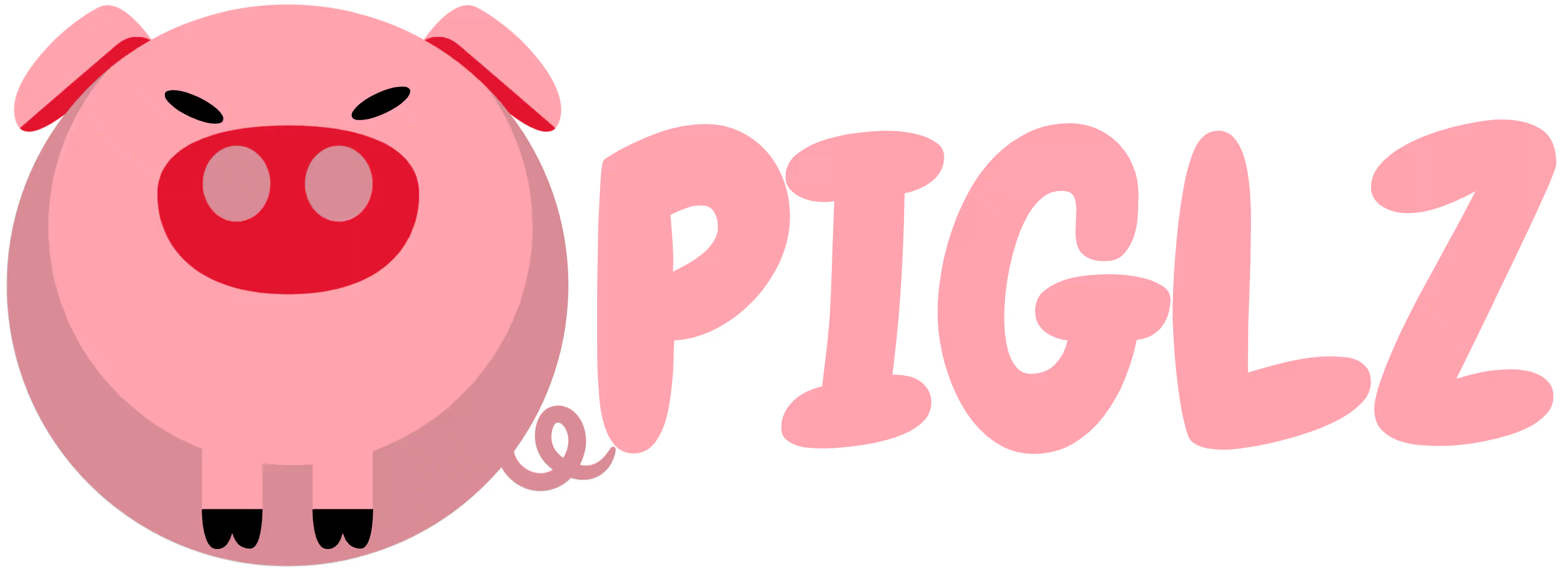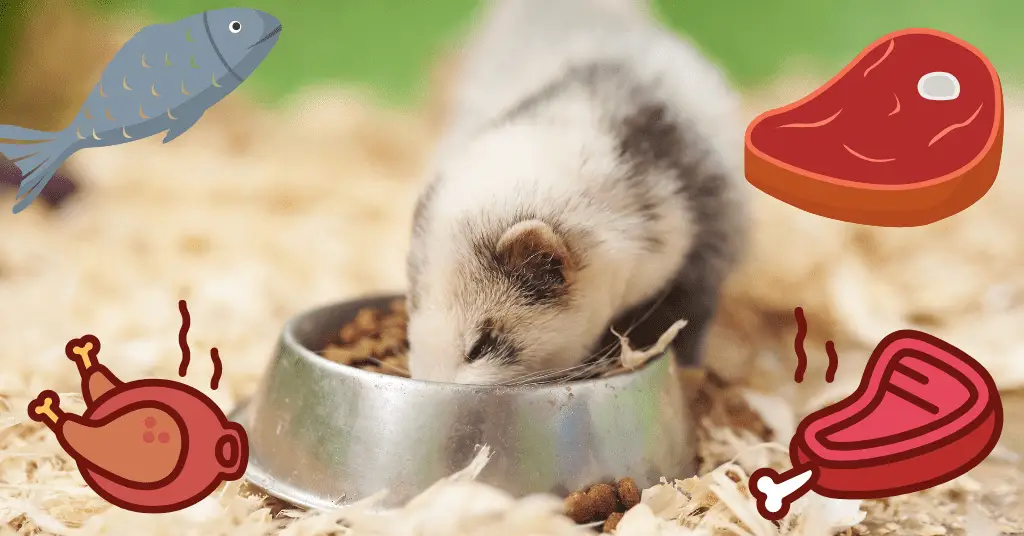You’re first thought once you get a ferret was probably what do ferrets eat? The pet store may have given you some recommendations for a few foods, or maybe some pre-packaged pet food formulations that will meet your needs for a few days.
But truthfully, a ferret’s nutritional requirements are more demanding than what most packaged foods can provide, and they need a diet rich in fresh animal protein in order to be healthy and avoid a malnourished ferret. Usually, this comes in the form of raw meat.

What should I feed my ferret?
Ferrets are carnivores, and as carnivores, their diet should consist mostly of meat protein and animal products. The best way to provide them with the nutrients they need is through a raw meat diet of fresh meats.
This can be supplemented with some commercially prepared ferret food, but it shouldn’t be the mainstay of their diet.
A typical ferret diet should consist of:
- Beef, beef mince, and organs such as the heart, liver, etc
- Freshwater Should always be available
- High-quality premium kitten food. Ferrets can eat kitten food if the main ingredient is meat-based. Avoid filler foods and adult cat food.
- Chicken, chicken wings, chicken carcasses with their skin removed, and organs. (Note: See bone warning below)
- Raw animal bones (which are used to clean ferrets’ teeth) (Note: See bone warning below)
- Cooked egg, but only occasionally. It should be viewed as a treat.
- Quality meat products
- Lamb, lamb hearts, organs
Ferret diets choice recommended by the American Ferret Association.
Bone warning: Bones can be a healthy choice for ferrets as they are good for their teeth and provide essential minerals and nutrients. However, you should only feed your ferret raw bones that are large enough to not be swallowed and choked on.
You should never give your ferret cooked bones as these can splinter and cause serious internal injuries.
If your ferret has any sort of dental disease, it may be unwise to allow them to chew on bones, and you should check with your local vet clinic for the ok in regards to your ferret.

Baby ferret diet
The baby ferret’s diet is the exact same as an adult ferret. After about 6 weeks of nursing with their mother, ferrets will begin to move to a more solid diet of raw meats and fat.
Avoid carbo-loading your pet ferret!
A lot of processed foods, especially those aimed at the “kibble market” will often be high in carbohydrates. This is something you should avoid feeding your pet ferret as they are carnivores and their intestinal tract is not designed to digest plant matter efficiently.
Carbohydrates that are found in some kibble can cause health problems for your ferret such as pancreatic disease, so it’s best to just steer clear of them altogether.
A diet high in carbohydrates can also lead to obesity in ferrets, which can cause a whole host of other health problems.

Does a diet change when a ferret is pregnant?
Ferrets rolled snake eyes when it comes to easy pregnancies and lack of issues that can pop up.
Ferrets are often struck with several issues during pregnancy which can lead to death if not treated properly.
During pregnancy and lactation, the food you give your ferret is crucial to avoid as many problems as possible.
For pregnant ferrets, You should switch to an alternative ferret food such as a premium ferret feed like Marshall Premium as it has lots of vitamins and nutrients and proteins and fat that your mama ferret needs.
Other grain-free ferret foods are also advisable if you can’t find Marshalls premium, such as zupreem. As long as their main ingredients are meat protein.
You may still supplement with raw meats and eggs as well. The important thing is to be sure she is getting lots of fat, the vitamins, and protein levels ferrets need to bear a healthy kit.
An important question that comes up is what raw meat can ferrets eat while pregnant? All of them. There are no restrictions, and can even eat more exotic meats like rabbits or game birds.
Avoid wild animals as they often contain parasites. Meat from the grocery store is much better.

Special diets for diabetic ferrets
Usually, a ferret that has diabetes has already been on a poor diet and is probably overweight.
A good diet for a diabetic ferret is one that is lower in sugar and carbohydrates.
A high protein, low carbohydrate diet is best, and there are several commercial foods available that are formulated for diabetic ferrets.
In most cases, a vet clinic will have various recommendations and may have told you what you need to know.
Given this is a medical issue that’s rather serious, it’s advisable to follow the advice of your veterinarian in the matter.
For the most part, A diabetic ferret diet will consist of most of the same foods as a normal ferret.
Ratios and feeding times may be adjusted to promote weight loss and to keep blood sugar levels steady.
A good rule of thumb is to make sure that 50% or more of the ferret’s diet is protein, with fat making up no more than 30%.
The rest of the diet can be made up of carbohydrates, though it’s best to avoid processed foods and simple carbs like sugar as much as possible.
Always read the ingredients on the back of the food label to be sure what you’re feeding is appropriate.
Some companies will sneak in a lot of sugar or other carbohydrates, so it’s best to avoid them if possible. Raw diets with supplemental commercial foods are always recommended for carnivorous ferrets.
If you suspect your ferret has diabetes, please take them to the vet right away as it can be a serious condition.

Additional supplements for ferrets
There are several issues with adding additional supplements to your ferret’s foods. A ferret on a proper healthy balanced diet requires NO additional supplements.
Some people recommend adding vitamins to a ferret’s diet, but this can actually be dangerous.
With that said, there are certain situations where you may wish to enhance your ferret’s diet with additional alternative supplements, here’s a list of the most commonly used by ferret breeders and keepers:
Taurine: Taurine is a critical component for ferrets. Taurine plays an essential role in their cognitive and visual abilities, and it can lead to significant damage or death if they don’t get enough of it.
The taurine in heart meat so essential to the diet. Freezing (as many of us do with our ferret meats) has a detrimental impact on food’s taurine content.
Some individuals struggle to maintain a steady supply of heart meat. It’s a good idea to keep taurine on hand in case you run out.
It may also be sprinkled over the meal. Every day, 500mg is advised for each ferret that has a taurine deficiency.
Reishi: Reishi is a type of dried mushroom that contains antioxidants that are great for reducing inflammation in ferrets. It’s also been shown to be helpful with ferrets who are suffering from lymphoma.
It’s possible to have shown the ability to help fight potential cancer from starting in the first place, but more studies are needed.
Older ferrets with stiff joints will appreciate having some Reishi once and a while.
Additional frequently asked questions about feeding ferrets:

What Human Food Can Ferrets Eat?
Ferrets can indeed taste sweet things, but they are carnivores through and through.
Ferrets enjoy sweets, dairy products, raisins, fruit, and vegetables, but these should be avoided since they might cause diarrhea and fluctuations in blood sugar.
Ferrets are strictly carnivores and should not eat anything high in carbohydrates or sugars.
They may also enjoy the occasional chicken nugget, hot dog, or piece of lunch meat as a treat, but such things that are high in preservatives should be only used as a treat and not as a mainstay of their diet.
Chocolate can kill ferrets just like it can kill dogs, so it’s best to keep it away from them entirely.

Can Ferrets Eat Cat Food?
Certain types of kitten foods can be fed to ferrets as long as they are high in meat proteins and low in carbohydrates.
Avoid foods that contain grains, corn, or wheat as these can cause digestive issues in ferrets.
In general, it’s best to avoid feeding your ferret cat food on a regular basis as it’s not a well-rounded diet for them, but can be used in a pinch.
Avoid adult cat foods which are often packed full of carbohydrate fillers that can make your ferret sick.
Side note: Your cat shouldn’t eat this garbage either.

Can Ferrets Eat Dog Food?
No, do not feed your ferret dog food. It’s high in fiber and vegetable proteins which your ferret can’t digest.
It’s a bad choice and should never be given to your ferret.

Can Ferrets Eat Bacon?
Bacon is fine as a treat for your ferret, But it’s very high in sodium and fat which can cause other issues including obesities.
Bacon should only be given to your ferret on occasion and not as a mainstay of their diet.
Bacon can be either cooked or raw, raw being preferred.

How Long Can a Ferret Go Without Food?
Ferrets shouldn’t be allowed to go more than 1 day without access to food as they have a very high metabolism and can easily become sick if they don’t eat.
If you must leave your ferret home alone for more than 12 hours, make sure to leave them enough food for the entire time you’ll be gone plus some extra just in case.

Best Kitten Food for Ferrets?
Any kitten food that is high in animal proteins and low on fillers. Avoid anything with vegetable proteins and fiber.

Can Ferrets Eat Raw Fish?
Can ferrets eat raw fish? What about tuna? The answer is yes, ferrets can eat fish, however, it’s not a natural part of their diet.
Fish can cause your ferret’s stool to smell fishy which is quite unpleasant and the reason many will opt not to feed their ferret fish.
Fish can also be high in mercury and microplastics which can be harmful to your ferret.
If you choose to feed your ferret fish, make sure it’s fresh and cleaned properly.
It’s our recommendation to keep fish as a treat rather than a mainstay of their diet, this includes canned tuna.

Can Ferrets Eat Raw Chicken?
Yes! While raw chicken will make humans sick, ferrets are carnivores with a very different digestive system that’s better equipped to handle bacteria.
That being said, you should still clean the chicken properly and avoid feeding your ferret chicken that’s been sitting out as it can make them sick.
Always give fresh chicken to your ferret and avoid processed chicken nuggets or lunch meat as these often contain preservatives and other fillers that can be harmful to your ferret.

How Much Water Should a Ferret Drink?
Each ferret is unique and will drink different amounts of water depending on its activity level, diet, and health.
The average rule is 50 to 100mL per kilogram of weight per day.
However, A ferret should always have access to as much freshwater as possible and you should check their water dish regularly to make sure it’s clean and full.

Can Ferrets Eat Pork and Ham?
Ham is far too salty for ferrets and pork can contain parasites that can make your ferret sick (Trichinella larva).
Both ham and pork should be avoided as part of your ferret’s diet.

Can Ferrets Drink Milk?
As a very very rare treat. Like once or twice a year in very small amounts. Otherwise, it should be avoided. That goes for any dairy products such as cheese and yogurt and ice cream.
Just say no to those adorable eyes that want to lick your ice cream spoon.

What Do Ferrets Eat in the Wild?
Ferrets are small, carnivorous mammals that are closely related to weasels, polecats, and otters. In the wild, ferrets typically eat small animals such as rodents and rabbits.
They will also eat birds, lizards, snakes, and insects. Ferrets have sharp incisors that they use to bite and kill their prey. They also have long canine teeth that they use to puncture and tear flesh.
Ferrets are opportunistic feeders, which means that they will take advantage of any food source that is available to them.
This makes them very adaptable and able to live in a variety of habitats. Ferrets are not picky eaters and will usually eat anything that is put in front of them.
However, it is important to give them a diet that is high in protein and fat in order to maintain their health. Ferrets like any animal or human will eat things that aren’t good for them.


